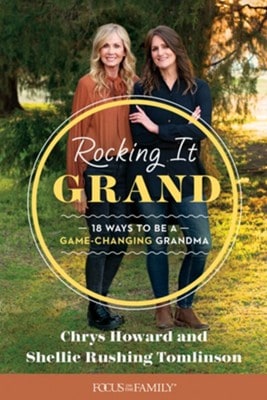
How To Get Your Kids Talking
As a parent, you know each child is different. Some are talkative, some are not. For children to communicate well, we have to take the first steps to teach them.
Home » Parenting » Grandparenting » How Grandparents Can Listen and Communicate

As soon as grandkids are old enough to talk, they begin asking questions. The role of grandparents depends on learning to listen and communicate.

Today, the role of grandparents exists in an ever-changing, fast-paced, highly-competitive, busier-than-ever world. We struggle with balance as we help our children manage theirs―grandbabies, work, exercise, staying healthy, and leading our growing families. Most importantly, grandparents have the ability to listen and communicate, value our grandchildren’s thoughts, and our grandchildren to Jesus.
The following three excerpts have been adapted from various chapters in the duo’s upcoming book: Rocking It Grand: 18 Ways to Be A Game-Changing Grandma.
Learn more about the depths of grandparenting in this collection of insightful, humorous, and spiritually nutritious anecdotes.
As soon as grandchildren are old enough to talk, they begin asking questions. A lot of questions. And they lob those questions at us with a pace that can be tiring, if not totally overwhelming. The role of grandparents depends on learning to listen and communicate throughout our grandchildren’s questions.
We’ll unpack the gold hidden in these questions in just a moment, and we’ll see how they can position us to be relevant in our grandchildren’s lives for years to come.
But first I’ll share a tip that can preserve our sanity throughout our grandchildren’s Q&A games. It reminds us to breathe and to remember that not all questions are created equally.
One day, I had an epiphany about my first grandchild’s endless interrogations. Emerson was an itty-bitty thing riding in my car. As was her custom, she was happily peppering me with questions about anything, everything, and nothing. I suddenly realized it wasn’t the answers Emerson was interested in. But the conversation!
It came as a relief when it dawned on me that Emerson didn’t really want to know why the sky was blue. She simply enjoyed the back and forth of communicating. That one realization created our “Silly Question Game.”
I started it by answering Emerson’s next couple of questions with totally nonsensical explanations. Puzzled at first, Emerson caught on quickly and was soon sold on the ridiculous dialogue.
The “Silly Question Game” goes something like this:
“Keggie, why is the sky blue?”
“Because frogs like to hop.”
“But Keggie, why do frogs like to hop?”
“Because turtles have shells.”
I think you see the pattern. Clearly, my answers had nothing whatsoever to do with Emerson’s questions. Communication was everything, and the sillier the exchange the more we enjoyed it.
Emerson is now a preteen. As you might imagine we no longer play the “Silly Question Game,” but she and I both enjoy reliving the memory. It’s written into our story.
Conversations with Emerson and the grandchildren who came after her have now changed. As you know, little ones’ queries change as they mature. They begin to ask questions that can be just as hard to answer as “Why do elephants have long noses?”
I think we can all agree our grandchildren ask questions we can’t and shouldn’t answer because the subject matter isn’t age appropriate or it’s just too difficult for them to understand. And there are also questions that only their parents should address.
But let’s be honest with ourselves. There are just as many other times when we put their questions off or give them a place-holding type of answer because we just don’t have the energy.
It’s why I highly recommend stopping to ask God to replenish our strength in our role as grandparents. Jesus is the well that never runs dry. As for me, I’m needy and I know it! I’m always asking the Lord to remind me when I’m trying to do anything in my own power, and He is faithful to do just that.
Little kids ask endless questions because there is so much about their world they simply don’t know. They’re refreshingly honest about their ignorance.
Our grandchildren are always processing. They’re curious about everything, and they turn to us because they believe we have the answers.
Let’s think about what that means. Our role as grandparents means that we won’t always be our grandchildren’s go-to source for information. As they grow, so will their circles of influence. We all know we’re in a temporary season with our grandchildren.
Philippians 3:2-4 says, “Do nothing from selfish ambition or conceit, but in humility count others more significant than yourselves. Let each of you look not only to his own interests, but also to the interests of others.”
When grandchildren ask us questions, we can look directly to their interests. Engaging in conversation may change over time, but your relationship can stay constant. Consider the following questions while reflecting on how well you listen and communicate.
Let’s be sure we’re talking with them during these days and not just talking at them. The goal is to create a culture of conversation while the questions and answers aren’t nearly as crucial as they will be in the years to come.
Thinking through questions along with our grandchildren and allowing an exchange sends them the message we most want them to hear: Their thoughts matter because they do, and they’re worth our time and attention.
With God’s help, we can train ourselves to see the daily opportunities we have to invest in another generation. Then, we can make good use of our time together in the everyday moments. If we aspire to leave lasting words in our grandchildren’s lives that will help them find and nourish their faith in Jesus, we must live in a certain way now.
We must remind ourselves that our grandchildren won’t hear us later if we don’t listen to them now. In our role as grandparents, we can set ourselves up to be heard on the eternal things that truly matter by intentionally engaging today on the topics that don’t seem important. There’s a day ahead when we’ll be glad we did!
© 2021 Shellie Rushing Tomlinson and Chrys Howard. All rights reserved.
Article adapted from Rocking It Grand authored by Shellie Rushing Tomlinson and Chrys Howard, © 2021 Shellie Rushing Tomlinson and Chrys Howard. A Focus on the Family resource published by Tyndale House Publishers.





As a writer and a former senior editor for Howard Publishing (now Simon & Schuster), Chrys Howard has had a hand in the publication of more than a 100 books with a million copies in print in six languages. She has authored nine books herself, the latest of which include Rockstar Grandparent, You and Me, Daughter, and Big Hugs for Grandmas. Chrys hosts a radio show called It’s a Mom Thing and personally mentors young moms through an organization her sister created called Heartfelt Ministries. Chrys and her husband, John, have three grown children including Korie Robertson, a star of the popular TV show Duck Dynasty. The couple also has 14 grandchildren. Learn more about Chrys at her website, chryshoward.com.
Read More About:

As a parent, you know each child is different. Some are talkative, some are not. For children to communicate well, we have to take the first steps to teach them.

Foster a strong relationship between your children and their grandparents by creating opportunities for them to interact

If we want our marriage partnership to be beautiful, meaningful and lasting, then we ought to be living out God’s grace by extending it. And that means building each other up one word at a time.
